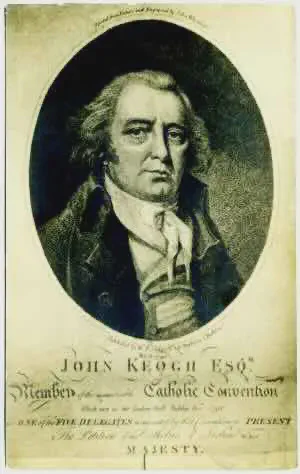- /
- Celtic calendar /
- 12th /
- December 03 /
- December 03, 1792

The Catholic Committee was a county association in late 18th-century Ireland that campaigned to relieve Catholics of their civil and political disabilities under the kingdom’s Protestant Ascendancy. After their organisation of a national Catholic Convention helped secure repeal of most of the remaining Penal Laws in 1793, the Committee dissolved.
The Catholic Committee and the Back Lane Parliament
In 1773, Kenmare convened a meeting of prominent Catholics in Dublin, representatives of the surviving Catholic gentry and senior bishops.
While pleading for penal laws relief, their Catholic Committee foreswore any intention of overturning the Williamite Settlement.
They also demonstrated their loyalty by helping to recruit the soldiers in Ireland to fight for the Crown in the American Colonies in the 1770s and, later, by supporting the authorities as they suppressed Whiteboy agrarian protest in the 1780s.
Assisted by Edmund Burke, who in 1764 had drafted a critical commentary on the penal laws that was widely circulated at Westminster, the pro-government policy appeared to pay dividends.
Irish Act of 1774
The Irish Act of 1774 allowed any subject of George III “of whatever persuasion to testify their allegiance to him”, and the Catholic Relief Act of 1778 allowed Catholics, on taking a modified oath that abjured the temporal, but not the spiritual, authority of the Pope, to purchase land and join the army.
1782 - Tolerating Practicing Catholics
A further measure followed in 1782: the Irish Parliament, acknowledging the tolerated practice of the Catholic faith, repealed the laws that compelled Catholic bishops to quit the kingdom, and binding those who had assisted at Mass to identify the celebrant.
In addition, Catholics might now own a horse worth £5, and, with the consent of their local Protestant bishop, open their own schools. In February 1791 elections to the Committee from the counties and from the five Dublin parishes brought a dramatic change in its composition.
The gentry and bishops were now outnumbered by representatives of those Burke described as the “new race of Catholics”: the emergent Catholic mercantile and professional middle class.
Demands for Penal Law Repeal
Stirred by news of revolution and reform in France and dissatisfied with the lack of progress since 1782, they demanded an immediate repeal of the remaining penal laws. This caused a split in the Committee with Kenmare leading a withdrawal of the more cautious gentry and bishops
Moved by parallels with the election to the National Constituent Assembly in France, the democratic exercise also caused alarm in the Catholic hierarchy. At the opening the Convention, assembled in the Tailor’s Hall in Back Lane, Dublin, in December 1792, Keogh was careful to place two prelates seated on either side of the chairmen. But the petition, as finally approved and signed by the delegates, was presented to the bishops as a fait accompli, with no implication that their sanction was sought or obtained.